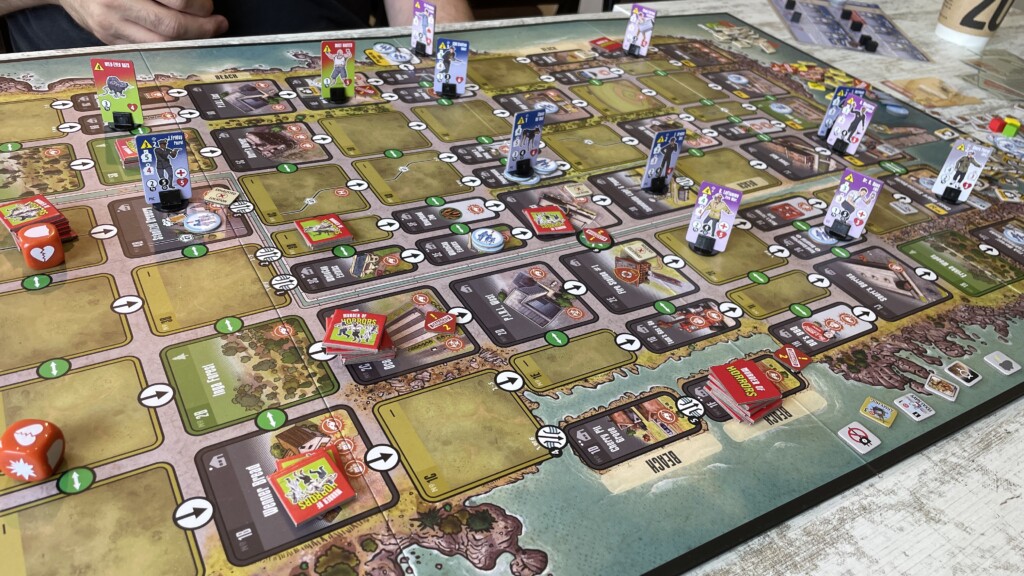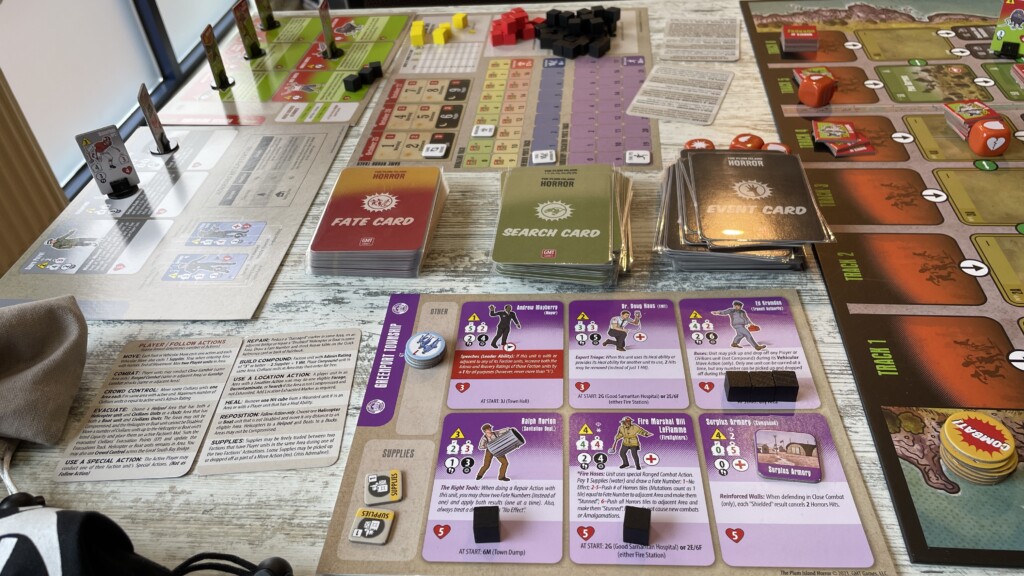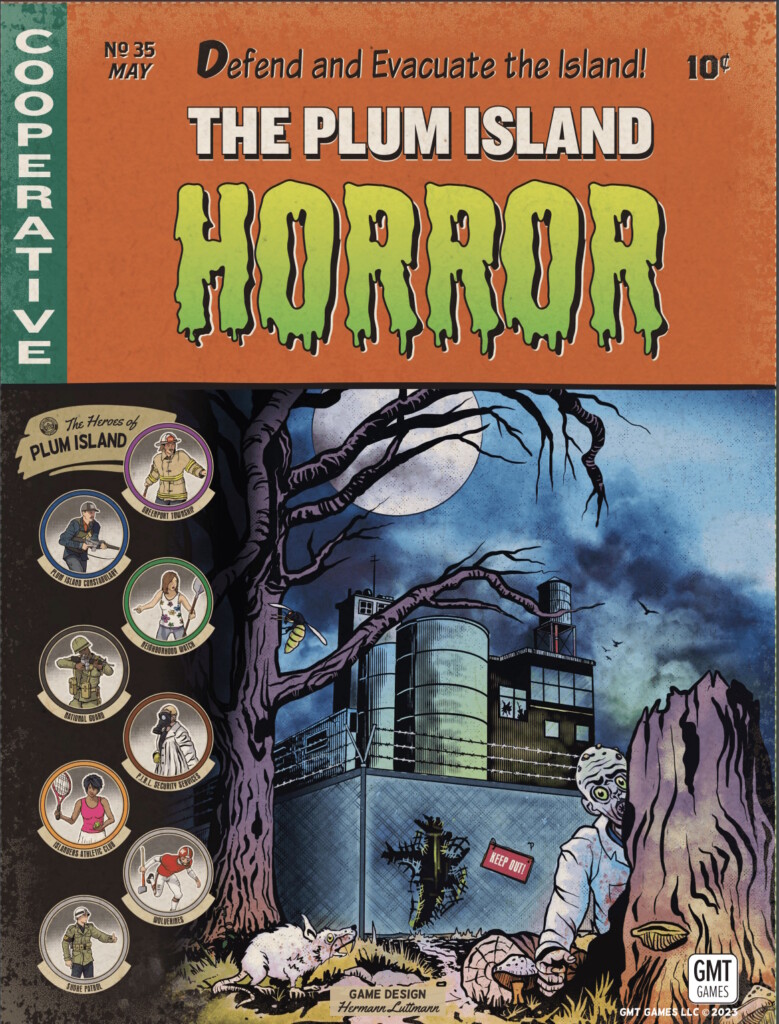The Plum Island Horror has players trying to help evacuate the locals on this strange island.
A strange, real*, island.
Plum Island is a sprawling isle off the Carolina coast and is home to the vibrant seaside town of Greenport. While the heart of the island’s daily hustle and bustle lies in its commerce and tourism, the predominant employer and revenue generator for the island was housed in a huge complex of nondescript buildings located on the north end of the island. This mega-corporation was known locally as “The Pearl,” or more precisely, the Plum Island Research Laboratory (P.I.R.L.) It was an enormous facility run by scientists who conducted government-sponsored biological research and experimentation. All legal and ethical practices of course—or so we were told.
The Plum Island Horror Game Overview
Quick Rules Summary
This will be a general top-level overview of how the game flows, there is plenty more going on.
The board is set up with ‘Murder of Horrors’ tokens on one end, the player’s Faction members on the board as well as scattered Civilian tokens. A game is played over 3 phases:
1 – Hunger Phase – In the night only, players need to feed the living faction members by paying supplies, or they take damage.
2 – Activity Phase – Draw a token from the turn order bag and activate it.
If it’s a fate card token, draw a fate card and complete the action which may include spawning new baddies and moving existing ones, then discard it. They attack when moving onto a space with a faction member or civilian.
If it’s an event card token, draw one and resolve it. These are usually very bad for the players.
If it’s a player token, that player may take a number of actions depending on which of the 9 rounds of the game you are in. Each turn starts with ‘Crisis movement’ giving any one of your characters a free movement.
Player Actions
There are 8 actions a player can take plus any special actions their faction members may possess which are based on their character role.
The first two are movement-based. Move a faction member into an adjacent accessible space on the board. The next is crowd control, which moves civilians from a faction member’s space to an adjacent space.
You can build the faction’s compound which has various abilities depending on the faction and costs supplies to build. Another action is to evacuate if you’re with civilians at an evacuation point.
You can repair to make damaged bridges accessible or damaged buildings/vehicles usable. You can heal (if your character is able) yourself or another faction member in the same area.
One reason you will repair is so you can forage to gain supplies, decontaminate to reduce the biohazard or search to draw an equipment card. These depend on what actions are printed on the area you are in as long as it isn’t damaged.
Finally is combat where you can attack (paying supplies for ranged attacks) via dice rolling. Melee combat adds biohazard cubes to the biohazard bag, even when being attacked.
Then, each other player can ‘follow’ and take any 1 action. But after each action, the players reveal a fate card, if one says ‘event’ at the bottom, an event card is drawn and resolved and no more players can follow this player’s turn.
End Phase
Finally, two cubes are drawn from the biohazard bag and depending on their colour, will move the biohazard marker that many spaces.

How do you win?
If the biohazard track gets to the end, the players lose.
When a horror unit gets to the bottom of the board, they overrun and if the overrun tracker gets to the end, the players lose.
If any single faction gets all the members eliminated, the players lose.
But if players evacuate 26 points worth of civilians and survive all 3 days, the players win.
Main Mechanisms
Action point allowance with the number of action points changing depending on the day and time of day.
It’s also a tower defence game as these monsters march down the board, you need to be able to take them out before they get to the end.
USP
I think the most unique thing is the theme…
Theme
…which is pretty cool. Plum Island is real and does research on animal pathogens so it is restricted to visitors. Rumours of experiments and weird creatures came from a discredited book but it sure makes for a fun background for any form of media.
Setup
Bits in bags, stacks of tiles and cards, tokens all over the place. It’s a mess!
Components & Artwork
If you’ve played a GMT game you know what you’re getting. The standard components, loads of little tokens and average artwork.

Ease of Teaching
There aren’t that many rules a player needs to know before playing. What you need to do to win, how to prevent a loss and the basic overview of the actions.
Everything is face-up information and everything that is face-down, such as what appears on cards as they’re drawn can be explained as they happen.
Similar Games
Arkham Horror is the obvious one for me. It’s what I thought during setup and while playing. Any of these Pandemic-style games will do, Marvel United is my favourite but quite the opposite of this.
You can throw in Bad Bones and Kingdom Rush if you want to play a tower defence style game
The Plum Island Horror Review
Positives
It has an interesting spoopy theme with one foot in reality for that special feel.
The turns go quickly and that ‘follow’ mechanism means you’re never out of the game for long.
The ‘crisis movement’ giving you one move for free means you don’t waste precious limited actions on a movement which feels like you’re doing much more each turn.
Negatives
It took a few hours for a 2-player game.
GMT need to start making their games look like they were made this decade. This is one year old and it looks like a game from the 00s.
Summary
A good game whose game length stops it competing with other games in its genres.
Jesta ThaRogue



Leave a Reply